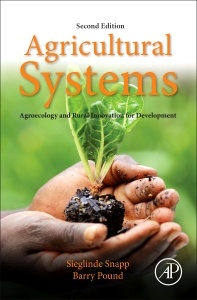Description
Agricultural Systems: Agroecology and Rural Innovation for Development (2nd Ed.)
Agroecology and Rural Innovation for Development
Coordinators: Snapp Sieglinde, Pound Barry
Language: English
Subject for Agricultural Systems: Agroecology and Rural Innovation...:
558 p. · 15x22.8 cm · Hardback
Description
/li>Contents
/li>Readership
/li>Biography
/li>Comment
/li>
Agricultural Systems, Second Edition, is a comprehensive text for developing sustainable farming systems. It presents a synthetic overview of the emerging area of agroecology applications to transforming farming systems and supporting rural innovation, with particular emphasis on how research can be harnessed for sustainable agriculture. The inclusion of research theory and examples using the principles of cropping system design allows students to gain a unique understanding of the technical, biological, ecological, economic and sociological aspects of farming systems science for rural livelihoods.
This book explores topics such as: re-inventing farming systems; principles and practice of agroecology; agricultural change and low-input technology; ecologically-based nutrient management; participatory breeding for developing improved and relevant crops; participatory livestock research for development; gender and agrarian inequality at the local scale; the nature of agricultural innovation; and outreach to support rural innovation. The extensive coverage of subjects is complemented with integrated references and a companion website, making this book essential reading for courses in international agricultural systems and management, sustainable agricultural management, and cropping systems.
This book will be a valuable resource for students of agricultural science, environmental engineering, and rural planning; researchers and scientists in agricultural development agencies; and practitioners of agricultural development in government extension programs, development agencies, and NGOs.
Section I: Reinventing Farming Systems 1. Introduction 2. Agroecology: Principles and Practice 3. Farming-Related Livelihoods 4. Farming Systems for Sustainable Intensification 5. Designing for the Long-term: Sustainable Agriculture
Section II: Resources for Agricultural Development 6. Low-Input Technology: An Integrative View 7. Ecologically Based Nutrient Management 8. Participatory Breeding: Developing Improved and Relevant Crop Varieties With Farmers 9. Research on Livestock, Livelihoods, and Innovation
Section III: Context for Sustainable Agricultural Development 10. Gender and Agrarian Inequities 11. The Innovation Systems Approach to Agricultural Research and Development 12. Outreach to Support Rural Innovation 13. Climate Change and Agricultural Systems
Section IV: Tying It All Together 14. Tying It All Together: Global, Regional, and Local Integrations
Dr. Barry Pound started as an agronomist and has steadily widened his experience through farming-systems approaches to sustainable-livelihood development and agricultural innovation systems. His interests include bridging the interfaces between social and natural sciences, and between research and extension. Currently, Dr. Pound is a visitng fellow in Livelihoods and Rural Innovation, Livelihoods and Institutions Department Natural Resource Institute, University of Greenwich Kent, UK.
- Provides students with an enhanced understanding of how research can be harnessed for sustainable agriculture
- Incorporates social, biological, chemical, and geographical aspects important to agroecology
- Addresses social and development issues related to farming systems

